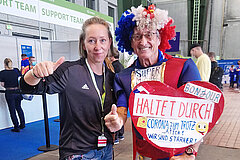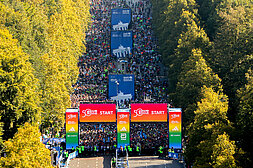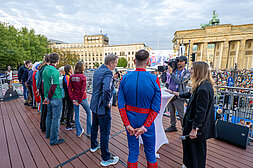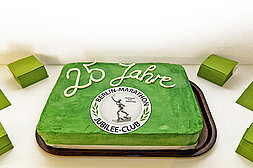JubiNews - everything you need to know.
ƒ Why is a marathon exactly 42.195 kilometres long?
In 1908, the Olympic Games were held in London. In order for the race to start in front of Windsor Castle and finish in the newly built Olympic Stadium, the previous 25-mile (40.234 km) route had to be extended. And an additional 385 yards (352 metres) were needed so that the finish line in the stadium was directly in front of the royal box. The distance was therefore exactly 42.195 kilometres. However, this was not defined as the official distance for a marathon until it was established by the International Association of Athletics Federations in 1921.
Do you believe this is a true story? Post a comment on Facebook.
Strange Statistics
- A runner is more likely to win a race wearing red than any other colour - crazy, right?
- The majority of Germans prefer to run in the woods. Running on a treadmill in the gym, on the other hand, is unpopular.
- Running alone is more relaxing than running in a group.
- During the Great Wall Marathon in China, runners have to climb 5,164 steps.
- Usain Bolt, the fastest man in the world, can reach a speed of around 44.72 km/h.
- The marathon world record for running backwards is 3:25 hours.
Did you know…?
- Runners take around 35,000 steps during a marathon.
- Over 1 billion running shoes are sold in the world every year. That means every 8th person buys a pair of running shoes every year! With a strong upward trend.
- The human body needs around 200 muscles to take one step.
- Music can increase running performance by up to 15%.
- The favourite food during a marathon is a banana.
- Regular running improves bone stability in the long term. Researchers at the University of Michigan came to the conclusion that just 12 to 20 minutes of running training (three times a week) increases bone mineral density.
- The first participation of a woman in a marathon with an official start number took place in 1967 at the Boston Marathon.
Youngest vs. oldest Marathon Finisher of the World:
The oldest marathon finisher in the world is a British-Indian runner. He completed a marathon at 100 years old (8:25:16) in 2011. He started running at the age of 89. At age 92 and with a time of 7:24:36, an American holds this record for the women.
The youngest marathon runner in the world is from India. He had already completed 48 marathons before he reached age five.
Running makes you...
...more attractive!
Not just due to calorie burning, muscle building and so on: regular exercise in the fresh air makes you feel great about yourself. This boosts your self-confidence and promotes your positive charisma.
...smarter!
In fact, regular running promotes the production of new nerve cells and blood cells, which in turn leads to an increase in your brain volume. This not only makes you smarter, but also protects you from dementia in the long term.
...more creative!
Intelligence boosts the ability to build bridges. An important factor in the development of creativity. So if you want to get into your creative process, you should go for a run.
...more motivated!
Running neutralises stress hormones, providing you with fresh energy and clearing your head. This mobilises new inner strength, giving you more motivation for everyday tasks.
„Yes, you can!“
With sensible training and the right attitude, anyone can run a marathon.
Related News










BMW

BMW GERMANY - A STRONG PARTNER FOR RUNNING.
BMW has been the title sponsor of Germany's biggest marathon since 2011. At this running event, the world's elite come together to top the current best times.
Strength. Endurance. Efficiency. These are not only the most important attributes of a runner, but also apply to BMW's sustainable vehicles. BMW has been setting standards in sustainability for years and successfully demonstrates them at the BMW BERLIN MARATHON. But also before the event BMW accompanies the running community in their preparation and emphasizes the joy of running. With the perennial RUN FOR JOY campaign, BMW, supports the athletes in their preparation - together they make the impossible possible. The lead vehicle, the new BMW i5 supports the runners on the course. It has exactly the qualities needed for a successful marathon run: intelligent and responsible use of resources. And it is precisely with these skills that the all-electric vehicle guides the runners safely, purposefully and in an environmentally friendly manner through the capital.
More than 50 vehicles and around 15 scooters of the C evolution class are part of the fleet of support vehicles provided by BMW for the BMW BERLIN-MARATHON. In addition to the iX as a safety car, the latest i-models from the car manufacturer are also in use as shuttle and organization vehicles. With this commitment, BMW supports the sustainable development of modern technology and the sport of running.
adidas

Everything at adidas reflects the spirit of our founder, Adi Dassler. Improving the athlete’s performance was his goal; today, his legacy continues with the consumer at the heart of everything the adidas brand does.
The number of runners in Germany is constantly increasing. No matter where they come from, they all have the same goal: Improve. Better runners, better athletes and in the end a better version of themselves.
adidas Running has something for everyone – we want help each person achieve their individual goals. What counts is personal development, which goes far beyond the personal best.
Abbott

At Abbott, our 114,000 employees in more than 160 countries are devoted to advancing life-changing technologies that help people achieve their full potential. Our medical devices, diagnostic tools and nutrition products are designed to enable individuals to reach their personal best, however they define it. By sponsoring the Abbott World Marathon Majors, a series of the six largest and most renowned marathons in the world, including the BMW BERLIN-MARATHON, we are not just celebrating the pinnacle of physical endurance and determination – we are reinforcing our commitment to improving lives. The Abbott World Marathon Majors are a testament to health and the human spirit at their finest, showcasing that with the right support and determination, every finish line is within reach.
More on Facebook at www.facebook.com/Abbott and on Twitter @AbbottNews and @AbbottGlobal.
Zalando

Are you ready to take your running to the next level? As the official sponsor of the BMW BERLIN-MARATHON, Zalando is here to help you reach your goals. Running a marathon is challenging enough - you need the right equipment to feel completely comfortable. Our functional sportswear can do much more than just look good: From marathon training to relaxed runs - find your perfect outfit at Zalando and run with us!
GENERALI

Generali Germany has been our partner since 2018. The insurance group is part of the international Generali Group and thus also part of a company that is over 190 years old, its history and its heritage. In 2017, the company launched a new sponsorship strategy - “Generali moves Germany”.
The initiative aims to motivate people to lead active health and environmentally conscious lives. Taking part, not watching, is crucial here. In recent years, Generali has thus become one of the largest and most important sponsors in German running. Running promotes physical and mental health and thus has a preventive effect against numerous common diseases. Moreover, hardly any other sport can be practiced in such a resource-saving and environmentally friendly way. Together with the event organizers, Generali develops programs that make major events demonstrably sustainable: in the areas of environmental and climate protection and social commitment.
About 9 million customers are insured with the companies of Generali Germany, which include the brands Generali, CosmosDirekt and Dialog in the life, health and property/casualty segments. Generali's objective is to be a lifetime partner for its customers, offering innovative, individual solutions and services thanks to an excellent sales network in exclusive and direct sales as well as in the broker channel. Generali Germany is part of the "Germany, Austria and Switzerland" (DACH) business unit, which was newly created in 2022.
ERDINGER Alkoholfrei

ERDINGER Alkoholfrei refreshes all finishers behind the finish line. ERDINGER Alkoholfrei is the ideal beverage after sports: isotonic, rich in vitamins, and low in calories. And ERDINGER Alkoholfrei has only 125 kcl per 0.5-liter bottle! Because a varied and balanced diet and a healthy lifestyle are important!
EY

As official Partner and Sustainability Consultant of the BMW BERLIN MARATHON, EY aims to further advance the sustainable transformation in sports. To this end and together with the event organizer SCC Events, EY will develop a concept to make the marathon as sustainable as possible.
Also beyond the course, we go the extra mEYle every day: EY is one of the major German professional services organizations with more than 11,000 employees at 20 locations. Working across Assurance, Consulting, Law, Tax, Strategy and Transactions, EY teams ask better questions to find new answers for the complex issues facing our world today.
This includes EY helping clients to develop and implement suitable sustainability concepts. In addition, EY has many years of experience in advising companies and organizations in sports.
NORQAIN

NORQAIN – Official Timekeeper of BMW BERLIN-MARATHON
Embrace the thrill of precision and endurance with NORQAIN at the iconic BMW BERLIN-MARATHON. As the proud Official Timekeeper, family-owned and fully independent NORQAIN exemplifies a commitment to quality watchmaking and its challenger “my life, my way” spirit.
Just as runners push their limits on the track, NORQAIN's timepieces stand strong against the test of time, making every second count in the pursuit of excellence. At the heart of our collection lies the revolutionary Wild ONE collection. Crafted to endure the most demanding challenges, this ultimate high-performance sports watch is both ultra-robust and ultra-light making it a perfect companion for athletes and watch enthusiasts alike.
We’re beyond excited to announce that as a special tribute to celebrate the 50th anniversary of the iconic BMW BERLIN-MARATHON NORQAIN will be unveiling a limited edition Wild ONE BMW BERLIN-MARATHON timepiece in 2024.
Maurten

You probably know that you burn carbohydrates when you run – both in training and during the race. And how hard it can be getting the fueling right, without GI-distress.
Our Hydrogel Technology makes sure you get enough carbohydrates without risking the session or race. But there are no shortcuts – science has shown that training your guts makes a huge difference.
VILSA

Naturality meets sustainability
As a mineral water, VILSA accompanies you with refreshing purity and light mineralisation. But that's not all! We are committed to people, animals and the environment: as a family-owned, midsized company in its fourth generation, we see it as an obligation and the core of our company philosophy to stand up for nature and the conservation of our resources in order to preserve them for future generations.
Discover our variety of products and enjoy the natural freshness of VILSA.






















